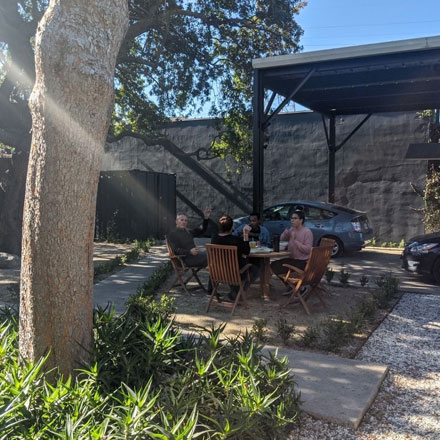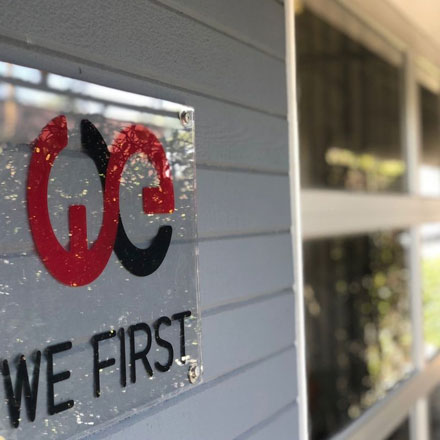
Purpose At Work
How Richard Sandoval Hospitality Puts The ‘Bee’ In Sustainability
Tennis was Richard Sandoval’s first love. He played professionally on the satellite circuit for several years after college, including against the likes of Sampras and Agassi. Eventually, though, he realized he “had to find a career because I was not going to make money on the circuit,” Sandoval recounts.
“I either had to go teach tennis or find another career … and I don’t have the patience to be on a tennis court five hours a day, feeding balls to someone.”
“So, I said to myself, ‘Richard, you’ve got to find something more engaging.’ Obviously, as a tennis player, you get that adrenaline rush from the intense pressure. So, I needed something more to activate my system. I said, ‘Well, my father owns restaurants [in Acapulco]. I should go to culinary school.’”
After graduating from the Culinary Institute of America’s New York City campus, he worked for his father for a few years in Mexico, then moved back to New York to start his restaurant.
“I never imagined or planned to have 65 restaurants around the world! It was just about creating one restaurant — and then the domino effect took over. But, again, me being an adrenaline junkie, it was like one and then another one, and then another one — it just took off,” he says.
Today, Chef Sandoval operates Richard Sandoval Hospitality [RSH], a global restaurant group based in Denver. “We’re on four continents,” he says, providing consulting services, brand licensing, operations, and marketing strategies to partners. “We focus mainly now on licensing.”
The Model Chef-Entrepreneur
What does licensing mean? Transforming hotel chains’ food and beverage departments. The Four Seasons Hotels & Resorts, Ritz-Carlton, Kempinski, Intercontinental Hotels & Resorts, and their like hire RSH to develop a destination restaurant brand within their hotels. Sandoval’s team, he says, then “builds the reputations, tells the stories, and grows the revenues” of each brand, according to its location, always elevating the overall dining experience.
“We all know that people don’t necessarily go to hotels to have great meals,” Sandoval argues. “But when you bring a third party into a hotel, a known chef, then people will go.”
Sandoval is certainly such a known entity. The James Beard Semi-Finalist for “Outstanding Restaurateur” is an internationally acclaimed global pioneer in contemporary Latin cuisine. He specializes in an innovative approach to combining traditional Latin ingredients — such as those he learned about cooking beside his abuela in her Mexico City kitchen when he was young — with modern, “best-in-class” culinary techniques. All with a proactively sustainable consciousness.
You can find RSH restaurants in 1o US states, and 11 countries as widely ranging as Costa Rica, Malta, Mexico, and Turkey. Sandoval’s many appearances on TV shows, including Top Chef Masters and Beat Bobby Flay — as well as his several bestselling cookbooks, such as Modern Mexican Flavors (2002), New Latin Flavors, (2014) make him recognizable the world over.
From concept to menu creation, Sandoval’s involved in the branding of all the restaurants in the group. “Food is constantly evolving. In a restaurant, you need to be current with what’s happening. We as humans, our diets are changing and we’re continuing to look at new things,” says Sandoval. “I think through globalization, we have access to the world now at our fingertips. So, now it’s up to me to bring all these things that people have access to into local markets, local restaurants, through these hotels.”
And that’s not just talk. Sandoval has been credited in Inc., The New York Times, and People, with singlehandedly introducing Latin cuisine to places as far-flung as UAE, Qatar, and Serbia.
Long Live the Bees!
One key event RSH has been supporting is a perfect example of the company’s impact orientation. Viva Abejas — which translates from the Spanish to “Long Live the Bees” — will take place at many RSH restaurants March 26 — April 22, 2024. The initiative aims for global reach: Any purchase of a bee-centric food or drink special from the Viva Abejas campaign will “drive us towards a better future for all,” Sandoval says.
“One in every three bites of food depends on bees for pollination,” says Sandoval. “And, as a restaurant group focused on Latin cuisine, bees are important as they are major pollinators of the agave plant, avocados,” and other Latin staples.
Unfortunately, though, says Sandoval, today’s “bees need our help.”
Each restaurant’s Viva Abejas menu will differ according to local traditions and available ingredients. Bee-pollinated dishes including Coconut Ceviche with orange blossom honey, Duck Confit Tacos with pickled vegetables, and agave honey and sweet treats such as Honey-Vanilla Cheesecake, will all benefit the World Bee Project.
Sandoval says he’s just trying to raise awareness. “One of our company mottos is, we like to create cultural experiences through food. And I think through food, I can impact people. So, through doing these menus, it creates awareness and it makes people ask questions. You say, ‘We’re using this type of pollen for this salad dressing,’ which makes the person ask the right questions.”
Why? What’s the process of pollination? Have Mexican chefs, for example, always relied on the work of bees? I remember hearing something a while back about bees being in trouble: Is that still going on?
Then, once they ask the initial questions, says Sandoval, “maybe they go home and they read about it more. And, once they read about it, they understand that there’s a big problem.”
The Bee List
Maybe they — maybe we all — learn that when honeybees and other pollinators pollinate avocado plants, they increase the fruit yield by 350 percent, and fruit weight by 18 percent, says Sandoval.
In 2004, an independent film called A Day Without a Mexican envisioned the economic havoc caused by the sudden disappearance of migrant workers in California. Well, “A Day Without a Honeybee” would dwarf that catastrophe.
The annual value of pollination services worldwide is more than $125 billion. In the US, pollination contributes $20–30 billion in agricultural production annually. In California alone, almond crops, which are wholly dependent on bees for pollination, are valued at over $3 billion.
Maybe we all learn that yes, one-third of all honeybees in the US have died in the last few years. Scientists don’t know the exact cause, says Sandoval, but a growing body of independent science links a class of pesticides called neonicotinoids (neonics) to widespread bee die-offs, both alone and in combination with other factors such as disease and malnutrition.
Bee Positive
Sandoval has won Bon Appetit’s Restaurant of the Year, as well as Mexico’s “National Toque d ’Oro.” RSH’s flagship location, NY’s Maya, was voted “BEST MEXICAN RESTAURANT IN MANHATTAN” in 2022’s Michelin Guide. He was awarded a rare honorary Doctorate in Culinary Arts from Johnson & Wales University. But those are not the measures of his impact of which he’s most proud.
Instead, he focuses on “investing in young people as the best way to lay the groundwork for the future.” RSH has an ambitious goal of educating 60,000 young learners by the end of 2024 with its bee-saving initiatives, including classroom packets, learning modules, educational videos, and a children’s book written by Sandoval himself.
The book Viva Abejas (2023) tells the story of a young boy, Ricardo, who meets a Queen Bee in his abuela’s backyard; she educates him on the importance of pollination and conservation. “It’s a study into sustainability and the food cycle for early readers and bee enthusiasts alike,” says Sandoval. All proceeds from the book go to the World Bee Project.
Once people become aware of a given important sustainability issues, such as bee decline, Sandoval argues, “they’re more likely to be engaged and to maybe do something about it. So, for me, I think it’s all about creating awareness.”





